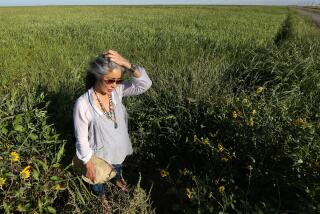Strawberry Field No Longer Forever With Farmer Gone
For decades, Hiro Kiyan tenaciously refused offers of an easier life.
The strawberry grower watched as other farmers in the area sold their property to developers. New neighborhoods seemed to appear as quickly as weeds sprouted in the Kiyans’ field.
Even when his 19-acre strawberry patch became the largest undeveloped flat piece of land in West Covina, Kiyan and his family refused to sell.
“What else would I do?” said Kiyan, 71, in October as he planted for the current season’s harvest. “I don’t have any hobbies like golf or fishing.”
Squinting into an afternoon sun, his hands rammed into soil-stained overalls, Kiyan said: “Strawberries, the only thing I like to do.”
But now the land that Kiyan worked for 48 years is going to be sold, family members said.
Kiyan died March 2 after suffering a massive stroke. When the strawberry season ends in June, Kiyan berries will grow no more.
“(None of his four children) would have stayed on the farm,” optometrist Paul Kiyan said recently as he watched laborers snip strawberries from the mounds of soil on his father’s land. “I guess he was disappointed.”
As the younger man surveyed the farm, a pensive look came over his face. Though cars whizzed by and an overcast sky threatened the next day’s harvest, he said: “I could see why he liked it. You see different types of people here, different types of lives.”
The death two years ago of Hiro Kiyan’s older brother, Hide, left him holding onto the land alone. More recently, his grip on the soil seemed to be loosening. He talked of retirement, or at least of slowing down.
He planted only four acres last fall. Paul Kiyan said his father intended to grow only enough strawberries to sell at the stand the family has run for more than 25 years. It sits on the edge of the farm facing Sunset Avenue, one of the busiest thoroughfares in the city.
Hiro Kiyan’s life was fiercely private and revolved around farming. He did not even like answering the phone in the family’s Baldwin Park home or working in the stand where the strawberries were sold, said his wife, Satsuki.
“Customers would ask too many questions,” she said.
He liked the simple life, said longtime friend George Harada, a vegetable farmer in Corona. “He took something big and made it simple.”
Kiyan expressed himself mostly in journals he kept for 20 years, recording everything from birth dates to the weather to names of visitors to the farm, his wife said.
“He could tell me what the temperature was (on a certain date), how much rainfall they had and how many berries they picked,” said Karl Horiuchi of Cal-Fruit Inc., which has bought strawberries from the Kiyans for more than 15 years.
Rented Land in 1930s
Hiro Kiyan was one of seven children of a Japanese immigrant couple who settled in West Covina. After graduating from Covina High School in the 1930s, Hiro and his brother Hide rented land so they could grow vegetables, Satsuki Kiyan said.
West Covina High School stands on the land on East Cameron Avenue where the brothers once harvested cabbage and cantaloupes, she said. They grew cauliflower next to what is now a gas station at Sunset and Merced avenues. In 1939, the brothers formed a partnership, bought their own farm on Sunset Avenue and began working it.
But world events disrupted their plans. They were among the 120,000 Americans of Japanese ancestry who were forced into relocation camps in 1942.
Hiro Kiyan, a man of few words, rarely spoke of his past.
“He always lived for today and talked about tomorrow, but he never thought about yesterday,” said his wife of 40 years.
Retained Property
Somehow, the brothers were able to retain their property, unlike many others who were ruined financially by relocation.
And when they were released from a camp in Wyoming in 1945, the Kiyans enthusiastically returned to their land.
While Hide did the paper work, Hiro spent most of his time caring for the field.
“That’s why my husband kept working and working and working,” said Satsuki Kiyan, who spent part of her honeymoon visiting farms in the San Joaquin Valley.
“(Farming) was just in his blood. Even on his days off, he would go to the ranch and look at it and walk it.”
‘Tired of Farms’
On vacations, recalled Anita Ota, 32, an art teacher and the Kiyans’ youngest daughter, “we would look at the farms. After a while, no one would get out of the car.”
“We got tired of the farms,” her mother said.
“But not him,” said another daughter, Linda Kiyan, 37, a speech therapist.
Horiuchi said it was difficult at first to talk with the brothers about anything but farming.
“If you could converse or talk about strawberries, then they’d talk to you,” he said.
“It was two to three years before I could comfortably walk into the fields and discuss anything with them,” Horiuchi said. “The second year we started discussing weather.”
Ignored Developers
The Kiyans rarely talked, however, to the developers who visited the farm, said Satsuki Kiyan.
Developers “would always leave their calling cards,” she said. The queries went unanswered, not even considered.
“We would receive calls about that site quite often,” said Jeffrey W. Collier, a senior planner for the city. “Developers would just be licking their chops and saying, ‘My goodness, if we could just get our hands on that.’ ”
Real estate brokers in the area estimate that the property is worth up to $4 million if single-family homes are built on it, and substantially more if developed with town houses, apartments or condominiums.
“Being that big, there’s an awful lot that could be done with that property,” said Richard M. Hanson, a real estate broker in West Covina since 1965. “I used to buy strawberries there myself. I often wondered why (Kiyan) didn’t sell it.
Could Farm Elsewhere
“The land is very valuable. The heirs apparently are going to find themselves millionaires,” Hanson said. “If they want to continue farming strawberries, they could sell the property here, buy land farther out in a rural area for a quarter of what they sold the property for, and still have money in the bank.”
But the children, who are commuting from their homes in Orange County to help take care of the farm, say they haven’t had time to think about selling it.
“We pulled together and we are going to finish this crop,” said Ota. “That’s all we’re thinking about. It’s still a part of us.”






